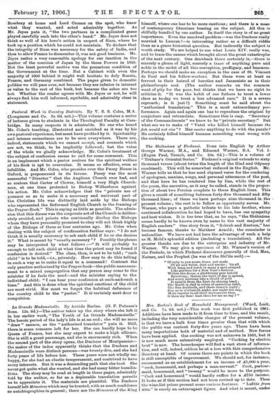La Grande Mademoiselle. By Arvkle Barine. (G. P. Putnam's Sons.
12s. 6d.)—The author takes up the story where she left it in her earlier work, "The Youth of La Grande Mademoiselle." The heroic period of the lady's life is at. an end ; she will no more "draw" cannon, as the "authorised translator" puts it. Still, there is some romance left, for her. She can hardly hope to be Queen of France, but she may expect to make a high alliance. She is still a great personage, and she is enormously rich. When the second part of the story opens, the Duchess of Moutpensier- the maker of the index apparently thinks that the Duchess and Mademoiselle were distinct persons—was twenty-five, and she had forty years of life before her. These years were not wholly un- happy, for she had an elastic temperament, and contrived to have many interests. But it was a descending path that she trod. She never got quite what she wanted, and she had many bitter humilia- tions. The story may be read at length in these pages, admirably told by the author, so far as a deplorable translation permits us to appreciate it. The materials are plentiful. The Duchess herself left Mensoires which may be trusted, with as much confidence as autobiographies in general; there are the Mentoires of the King himself, where one has to be more cautious ; and there is • mass of contemporary literature bearing on the subject. All this is skilfully handled by our author. In itself the story is of no great importance. Even the unsolved problem—was the Duchess really married to Lauzun ?—is interesting rather as a difficult riddle than as a grave historical question. But indirectly the subject is worth study. We are helped to see what Louis XIV. really was, and to trace the causes which brought about the great catastrophe of the next century. One drawback there certainly is,—there is scarcely a gleam of light, scarcely a trace of anything pure and noble in the midst of all this corruption, profligacy, and baseness. Perhaps we should make an exception in the case of St. Vincent do Paul and his fellow-workers. But these were at lead as fervent in their hatred of heretics and Jansenists as in their philanthropic zeal. (The author remarks on the common want of pity for the poor, but thinks that we have no right to criticise it. "It was the habit of our fathers to treat a lower class as to-day we treat a less advanced race." It is a severe reproach; is it just ?) Something must be said about the "authorised translation." This is a most extraordinary per- formance. Again and again one has to reproduce the original by conjecture and retranslate. Sometimes this is easy. "Secretary of the Commandments" we know to be "private secretary." But what are we to make of " Vatel who killed himself because the fish would not rise"? Has sauter anything to do with the puzzle? He certainly killed himself because something went wrong with the cooking.










































 Previous page
Previous page